To supporters, he’s the blunt-talking businessman America needs, a man unafraid to stir up controversy in order to shake up the status quo.
To detractors, he’s a bully who is ill-informed about many of the policies he’s instituting and someone who is more comfortable with lies than reality.
The two Senate candidates have reflected the voters’ deep disconnect — to an extent.
Renacci, who entered the Senate race in January after Ohio Treasurer Josh Mandel abruptly dropped out, cited Trump’s encouragement in deciding to run. He ran ads in the primary touting Trump’s record, even echoing Trump’s “America First” agenda with his own “Ohio First” campaign slogan.
But he does so despite a record on trade that is at odds with Trump’s sweeping skepticism toward many of the very trade deals Renacci voted for in Congress. He’s concerned about the tariffs, saying he wants them to be used as a negotiating tool and to not hurt Ohioans, and he voted against a Trump-endorsed spending bill he said was fiscally irresponsible. He also opposed the policy of separating undocumented immigrant families.
For his part, Brown frequently rages against Trump, speaking out against his immigration policies, the tax cut that he says benefits mainly the rich and the people he appoints to key positions, including the Supreme Court.
RELATED: Renacci slams Brown for not supporting Trump judge picks
But on trade, Brown and not Renacci is the candidate closest to Trump.
David Cohen, a political science professor at the University of Akron, said Renacci is a “free-trading, pro-business Republican,” while Brown has made blue-collar voters a centerpiece of his campaigns.
“Renacci is one of the wealthiest members in Congress,” Cohen said. “It’s hard for him to make that argument that he’s a friend of the working class.”
Brown talked to Trump about trade
Trade isn’t a new subject for Brown. In 2004 he wrote a 228-page book, “Myths of Free Trade: Why American Trade Policy Has Failed,” which was a direct attack on NAFTA, the same trade deal Trump has vowed to rip up.
Brown said he’s not sure the president understands the nuances of the trade issue but is happy Trump’s instincts on trade line up with his own. He said his approach has been to try to work with Trump when possible, such as on opioids, understanding that he’ll also occasionally be opposed to many of Trump’s policy ideas. He has, during the Trump era, been a sponsor of at least 10 bills that Trump has signed into law.
There is no question who Trump is supporting in the race — he’s given Renacci his full endorsement — but Brown seems more at ease with Trump than most Democrats. He’s been invited to the White House multiple times and spoke twice with Trump on the phone: a 30-minute conversation about trade a few weeks back, and one on “Buy America” provisions in February.
Did Brown like talking to him?
“Compared to my dentist?” Brown joked.
Renacci on Trump: ‘I’m very supportive of his policies’
Renacci said the Trump he knows stands in sharp contrast to the public perception of him. The man he’s gotten to know wants his children and grandchildren to live in a country that’s thriving, he said.
“If you had the chance to sit around with President Trump for 40 minutes…I promise you, you would say, ‘I like that guy,’” Renacci said.
Perhaps because of his early support for Trump during his presidential campaign, he is often called on to defend the president for something he has said or tweeted.
He has a honed response: “I (sometimes) don’t agree with the way he says things, but in the end, I’m very supportive of his policies.”
After former Trump campaign manager Paul Manafort was found guilty of eight criminal counts, and former Trump lawyer Michael Cohen pleaded guilty to eight criminal counts on the same day, Renacci said: “There’s no evidence of collusion, no allegation of wrongdoing against President Trump.”
“I’ve had a lot of attorneys in my life who have done some bad things afterward,” he said. “That doesn’t reflect on me. That reflects on them and their character and how they do things…in the end, none of this should reflect on what the president is doing, his agenda and him moving his agenda forward.”
Brown expressed more concern about White House’s legal entanglements but made clear he is not calling for the impeachment of the president, as many in his party are doing.
“I don’t think about it,” he said. “And no president has ever been impeached by his own party when his own party’s in the majority. That’s just not going to happen and I don’t see it happening any time soon. But I want to stop a lot of his policies when they hurt workers, when they hurt my state.”
Cohen said the election may hinge on whether the same blue-collar voters who backed Trump in 2016 flip to support Brown this year.
Brown says he’s not worried.
“I got a lot of those voters in 2012 and 2006,” he said. “And we’ll get them this time.”
FIRST OF THREE PARTS
This is the first of three stories on issues in the U.S. Senate race in Ohio. Look for follow-up stories in this newspaper each Monday over the next three weeks looking at where the candidates stand on domestic and foreign issues.
YOUR ELECTION SOURCE
Sign up for our daily Ohio Politics newsletter to get the latest news. Follow our team on our Ohio Politics Facebook page and on Twitter at @Ohio_Politics.
UPCOMING ELECTION EVENTS
Sept 10: Election forum with candidates running for Montgomery County Commission and the Ohio House 42nd District, Miami Twp. branch of the Dayton Metro Library, 2718 Lyons Road, 6:30 p.m.
About the Author


